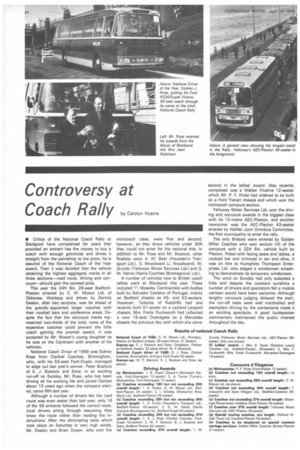Controversy at
Page 36

If you've noticed an error in this article please click here to report it so we can fix it.
Coach Rally by Carolyn Hyams
• Critics of the National Coach Rally at Blackpool have complained for years that provided an entrant has the money to buy a coach with enough gimmicks and drives it straight from the paintshop to the prom, he is assured of the National Coach of the Year award. Then it was decided that the vehicle obtaining the highest aggregate marks in all three sections—road route, driving and concours—should gain the coveted prize.
This year the 24ft 9in. 29-seat BedfordPlaxton entered by C. W. Moxon Ltd. of Oldcotes, Worksop and driven by Derrick Deakin, after two sections, was far ahead of the grandly appointed larger coaches with their cocktail bars and conference areas. Despite the fact that the concours marks represented two-thirds of the total, none of the expensive coaches could prevent the little coach gaining the premier award. It was accepted by Mr. Moxon's young daughter as he was on the Continent with another of his vehicles.
National Coach Driver of 1969 was Sidney Rose from Claribel Coaches, Birmingham, who, with his 53-seat Ford-Duple, managed to edge out last year's winner, Peter Bostock of E. J. Bostock and Sons, in an exciting run-off on Sunday. Mr. Rose, who has been driving all his working life and joined Claribel about 10 years ago when the company started, came fifth last year.
Although a number of drivers felt the road route was even easier than last year, only 16 of the 58 entrants followed the correct route, local drivers erring through assuming they knew the route rather than reading the instructions. After the eliminating tests which took place on Saturday in very high winds, Mr. Deakin and Brian Dyson, who won the minicoach class, were first and second; however, as they drove vehicles under 30ft they could not enter for the national title, in addition to Mr. Rose and Mr. Bostock, other finalists were A. W. Best (Housden's Transport Ltd.), D. Woodward (J. Woodward), W. Grundy (Yelloway Motor Services Ltd.) and G. W. Harris (Harris Coaches (Bromsgrove) Ltd.).
A number of vehicles new to British coach rallies were at Blackpool this year. These included 11 Moseley Continentals with bodies built by Salvador Gaetano of Portugal, mainly on Bedford chassis as 45and 53-seaters. However, Tatlocks of Radcliffe had one recently built 51-seater on a Leyland Leopard chassis, Mrs. Freda Duckworth had collected a new 16-seat Deansgate on a Mercedes chassis the previous day with which she came
second in the ladies' award. Also recently completed was a Walker Fineline 12-seater which Mr. P. F. Hicks had ordered to be built on a Ford Transit chassis and which won the minicoach concours section, Yelloway Motor Services Ltd. won the driving and concours awards in the biggest class with its 12-metre AEC-Plaxton, and another newcomer was the AEC-Plaxton 43-seater entered by Halifax Joint Omnibus Committee, the first municipality to enter the rally.
The only Bristols were entered by Golden Miller Coaches who won section (H) of the concours with a 32ft 6in. vehicle built by Plaxton. Fitted with facing seats and tables, a cocktail bar and trimmed in tan and olive, it was on hire to Humphrey Thompson Enterprises Ltd. who staged a windscreen smashing to demonstrate its temporary windscreen.
The wind on Sunday had only subsided a little and despite the constant sunshine a number of drivers and spectators felt a mobile canteen would have been welcome. Although lengthy concours judging delayed the start, the run-off tests were well marshalled and exemplary driving by the contestants made it an exciting spectacle. A good loudspeaker commentary maintained the public interest throughout the day,
































































































































